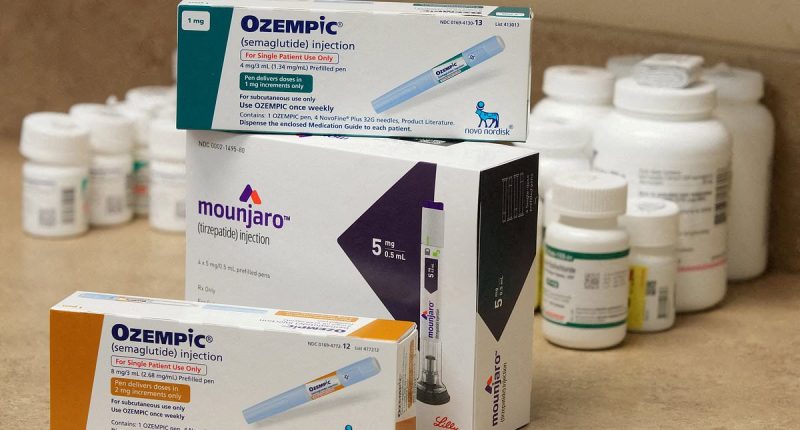Share this @internewscast.com
Game-changing weight loss jabs could help ward off up to 14 types of cancer, world-leading experts suggest.
Mounjaro, Ozempic and other fat-melting injections have ushered in a new era in the war on obesity, but have also been linked to other health benefits, such as slashing the risk of heart attacks, strokes and kidney disease.
Now scientists have discovered the drugs could reduce the risk of a range weight-related cancers including hard to diagnose types such as of pancreatic, kidney and ovarian.
The breakthrough research found the jabs were most effective at slashing the risk of colon and rectal cancers specifically.
Both have seen a disturbing rises in cases in the under 50s in recent years baffling doctors around the globe.
American scientists, who carried out the trial, said the findings show the drugs have a ‘preventative effect’ in people at higher risk of these 14 diseases.
However, they cautioned further research was necessary to confirm their findings.
Researchers also didn’t speculate why the drugs, which belong to class of medications called GLP-1 agonists, might lower a patient’s chances of cancer.

Mounjaro, Ozempic and other fat-melting injections have ushered in a new era in the war on obesity, but have also been linked to other health benefits, such as slashing the risk of heart attacks, strokes and kidney disease
Lucas Mavromatis, an expert in obesity at NYU Grossman School of Medicine in New York and study lead author, said: ‘Although obesity is now recognized as an increasingly important cause of cancer in the United States and worldwide, no medications have been proven to lower the cancer risk associated with obesity.
‘Our study begins to fill that gap by evaluating GLP-1 receptor agonists, a relatively new but widely prescribed medication that treats diabetes, obesity, and related conditions.
‘Our results suggest they may modestly cut the chance of developing certain cancers—especially cancers of the colon and rectum—and reduce rates of death due to all causes.
‘These data are reassuring, but more studies are required to prove causation.’
In the study, researchers studied data from more than 170,000 obese patients with diabetes, aged 57 on average.
Over a follow-up of a decade, they compared the cancer risk among patients on GLP-1 agonists against those on DDP-4 inhibitors, another diabetes medication.
The 14 cancers assessed included oesophageal, colon, rectum, stomach, liver, gallbladder, pancreas, kidney and post-menopausal breast.
Ovarian, endometrium and thyroid, as well as multiple myeloma and meningiomas, were the others.
They found those on GLP-1s had a 7 per cent lower risk of developing an obesity-related cancer than patients on DDP-4 inhibitors.
When other health benefits were factored in, these patients were also 8 per cent less likely to die over the 10-year period.
Overall the biggest reduction was seen for colon (16 per cent) and rectal (28 per cent) cancers.
These benefits were greater among women compared to men, with obese females on GLP-1s recording an 8 per cent lower risk of obesity-related cancer and 20 per cent lower risk of all causes of death compared to women treated with DDP-4 inhibitors.
The findings will be presented in full next week at the American Society for Clinical Oncology (ASCO) conference in Chicago.
Dr Robin Zon, ASCO president, said: ‘This trial raises an intriguing hypothesis: that the increasingly popular GLP-1 medications used to treat diabetes and obesity might offer some benefit in reducing the risk of developing cancer.
‘I see many patients with obesity, and given the clear link between cancer and obesity, defining the clinical role of GLP-1 medications in cancer prevention is important.
‘Though this trial does not establish causation, it hints that these drugs might have a preventative effect.

Bowel cancer can cause you to have blood in your poo, a change in bowel habit, a lump inside your bowel which can cause an obstructions. Some people also suffer with weight loss a s a result of these symptoms
‘Future research is needed to validate these findings, including in patients who do not have diabetes.’
The jabs were originally developed as a diabetes treatment, but in recent years has become one of the world’s most in-demand weight-loss drugs, with a host of celebrities—including Elon Musk and Boris Johnson—revealing they take it in a bid to slim down.
At least half a million NHS patients and some 15million in the US are now thought to be using weight loss jabs, which can help patients lose up to 20 per cent of their bodyweight in just a few months.
Obesity itself increases the chances of person suffering serious health conditions that can damage the heart, such as high blood pressure, as well as cancers.
Around two in three adults in the UK are obese or overweight, giving the country one of the highest obesity rates in Europe. In the US, the figure stands at almost 75 per cent.











